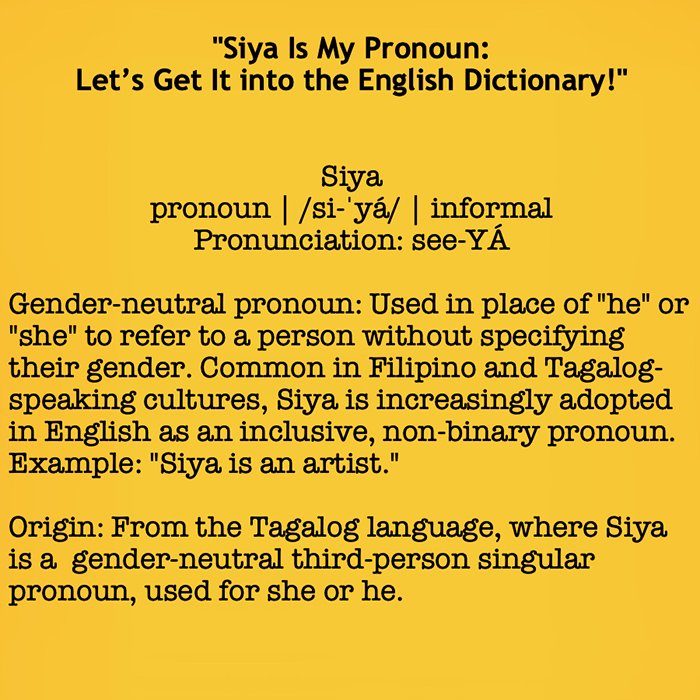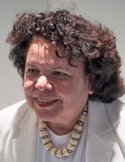‘Siya’ Is My Pronoun – Let’s Make Oxford Put It In the English Dictionary
/Why "siya"? It offers clear advantages over “they,” the current go-to option. First, "siya" is singular in Pilipino (with sila for plural), so there’s no confusion. As a new word in English, it comes with no extra baggage or alternate meanings. Plus, adopting "siya" promotes multiculturalism and provides a meaningful way to highlight Filipino culture.
Each year, the Oxford English Dictionary (OED), the bible of the English language, adds new words, many from other languages. For decades, the few Filipino-related words included didn’t exactly showcase the best of us. For example, “boondocks” (rough, remote, isolated country, from Tagalog bundok, meaning mountain) has come to mean “the middle of nowhere.” Amok (from Malay/Tagalog) is associated with chaotic violence, and juramentado (from Spanish times) refers to a sworn killer of non-believers.
In 2015, the OED began recognizing positive contributions of Philippine English by adding words like bongga (extravagant, stylish), halo-halo (a popular dessert), and kilig (romantically thrilled). In 2018, more words like bagoong (fermented shrimp paste) and “dirty ice cream” (sorbetes/ice cream) made the cut, thanks to Filipino speakers.
OED lexicographer Danica Salazar noted that this recognition helps legitimize Philippine English as a distinct variety. To truly leave a Filipino American legacy in global culture, we could build statues or name cities after our heroines. But how much more impactful would it be to plant a word in the English language that could blossom and bloom in daily use? Social engineering a new pronoun like "siya" would be a worthy cause!
Oxford English Dictionary Lexicographer Danica Salazar (Source: x.com)
Who can use "siya"? Anyone! You don’t need to be non-binary, American, or Filipino. Everyone can use the pronoun. Cisgender and non-binary folks alike support gender-neutral pronouns for promoting respect, inclusion, and dignity. You can use "siya" alone or combine it with other pronouns, like [siya], [siya/they], [siya/she], [siya/he]. Just get siya-ous already!
Oscar Peñaranda, first poet laureate of the SOMA Pilipinas Cultural District, supports the idea. “When we say 'siya,' it implies collective identity—an inclusion of kapwa (kindred), so the ‘I’ ego isn’t as prominent," he notes. “We even use 'siya' for non-human things, including them in our world of kapwa.”
Poet and novelist Eileen Tabios, inventor of the hay(na)ku poetic form, is also on board, encouraging fellow writers to adopt "siya" in their pronouns and literary works. She even composed a hay(na)ku for the occasion:
Kapwa-tids
evolve their
pronoun into ‘siya’.
So, how about it? Ready to kick-start a linguistic activist movement and get "siya" into the English lexicon? It's easier than you think! The OED adds new entries based on popular usage, and “siya” is already heavily used in Filipino American events and zoom calls. We just need to mainstream it; the more we use "siya," the sooner it can make its debut.
Here’s how you can help:
Use "siya" everywhere! Add it to your email signature, Zoom name, chats, social media, and everyday conversations. Encourage friends and family to join in.
Submit "siya" to the online submission form for new words of the OED, here. Simply fill it out as follows:
· What are you submitting? New word
· Word or Phrase? Siya
· Part of speech? Pronoun
· Pronunciation? see-YÁ
· Definition? Gender-neutral pronoun (he/she)
Since humor spreads new words fastest, we’re calling for pronoun/siya jokes! Post your creations on Instagram with the hashtag #siyaismypronoun and tag @omfrancestudio. (Here’s mine: "Call me Ishmael, my pronoun is siya!") Can someone please write a “Who’s on First?”- style joke using siya? Recently, Bindlestiff Studios promoted a Comedy Showcase where trans performers rocked the house with pronoun jokes exploring their political implications.
Let’s spark a linguistic activist movement and propose that English officially adopt the Filipino gender-neutral pronoun ‘siya.’
To help mainstream the movement, I’ve enlisted Oakland-based artist Carissa Potter to design a logo for the cause. Carissa, founder of People I’ve Loved, with over 600 stores globally, author of three books, and one of Ad Age's 24 Most Inspiring People of 2021, created an image you can download for non-commercial use to help promote the initiative. (Catch her pop-up shop exhibition at the Eleanor Hardwood Gallery at Minnesota Street Project in San Francisco, up until November 2, 2024; and big, BIG thanks to Eleanor Hardwood for connecting me with Carissa.)
Here’s the logo for your use:
So, what do you say? Shall we all come down from the boondocks, halo-halo it up, and bongga the English language with our gift word? If not, I just might run amok and go juramentado! Let’s feel the kilig together and shout: "My pronoun is siya!"
About the author. France Viana (siya/they) is a visual artist, art historian, curator, writer and mythologist who chronicles how Filipinx immigration is redefining what it means to be American. France founded and runs the ARROZidency, an artist residency program nurturing FilAm artists, and the Salo-Sala, a directory of Filipino American artist-owned spaces. Active in the Asian American community, France serves as Board Commissioner of the Asian Art Museum, and SOMA Pilipinas Cultural District Advisory Board. She is a 2023 Yerba Buena 100 Honoree and a Filipina Women’s Network “100 Most Influential Filipina Women” awardee. @omfrancestudio
More articles by France Viana






